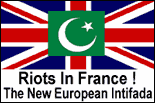British
National
Party
Anti-Jihad News Bulletin w/c April 9, 2007
Subscribe to this and other BNP
News Bulletins here http://www.bnp.org.uk/mailing_list.htm
No sign up required, just give your email address, that's
all.
1. GOVERNMENT MOVES TO MARGINALISE
EXTREMISTS
The problem is not extremists but Islam, a religion whose
followers recognise only the laws of God and see any other
law as an act of blasphemy.
http://news.bbc.co.uk/2/hi/uk_news/politics/6528305.stm
The government is planning to intervene in some mosques
to support Muslims who want to marginalise extremists.
Communities Secretary Ruth Kelly has announced a new role
for the Charity Commission, strengthening its task of
overseeing religious institutions. A £600,000 faith
unit within the commission will help Muslims strengthen
governance and leadership in mosques. But Britain's first
Muslim peer, Labour Lord Ahmed, criticised the measures
as a "rehash" of existing policy.
Desire and commitment
In a speech on Thursday, Ruth Kelly said: "I do not
under-estimate the difficulties we face or the scale of
this challenge. "But I know from my conversations
with Muslim communities up and down the country that the
desire and commitment to tackle extremism is there. "Success
will hinge on forging a new alliance against violent extremism.
We need to reach out and give greater support to the overwhelming
majority who are disgusted by terrorist attacks carried
out in the name of Islam." The Charity Commission's
new Faith & Social Cohesion Unit aims to encourage
registration, strengthen the governance and accountability
of religious institutions, focusing at first on mosques.
Some commentators have previously attacked the regulator,
accusing it of acting too slowly on reports of extremism.
The body was however a key player in the removal of the
radical cleric Abu Hamza from Finsbury Park Mosque. Hamza
was jailed for seven years in 2006 for soliciting to murder.
Ms Kelly's department has changed government strategy
by launching talks with a broader range of Muslim groups.
Access for women
But at the same time the largest body, the Muslim Council
of Britain, has received less attention, leading to claims
that ministers are talking only to those prepared to agree
with government. Lord Ahmed also criticised the measures
which include strengthening leadership at mosques, improving
access for women and citizenship lessons in schools and
madrassas. "I am not so sure this is going to work,"
he said. "The real issue is to find out the reasons
behind extremism and radicalisation." In a related
move, the Attorney General Lord Goldsmith said specialist
prosecutors are beginning to work with police officers
to improve how they target extremist preachers. The strategy
is part of the government's attempts to develop a plan
to prevent extremism, a key plank of counter-terrorism
policy.
'No quick fixes'
For the Liberal Democrats, Andrew Stunnell described the
measures as a "disastrous mix of good intentions
and poor analysis" saying the government should be
tackling deprivation which allowed extremism to breed.
"It was never suggested during the Troubles in Northern
Ireland that state regulation of Catholic churches would
have ended IRA activities," he said. Shadow attorney
general Dominic Grieve welcomed the involvement of the
Charity Commission, but on the new measures he said "we
have heard it all before". "The government needs
to realise that this is a long-term project with no quick
fixes. We have had enough rhetoric now we need action,"
he added. New research commissioned by the government
links radicalisation of young Muslims with a failure of
traditional mosque leadership. The study, written by a
Muslim academic, pinpoints a conveyor belt towards extremism
which starts with identity crises during teenager years.
These problems are then easily compounded by discrimination,
lack of opportunity and the poor quality of religious
leadership in some traditional mosques. The research warns
the government that extremist groups successfully recruit
by exploiting a combination of alienation and religious
illiteracy among youths. It names proscribed group Al
Muhajiroun as one of the groups having been most successful
as targeting students. But at the same time, the report
predicts that a positive British-Islam voice can emerge
to defeat extremists, if there is investment in religious
leadership.
2. INDONESIA'S SECULAR STATE
UNDER SIEGE
Indonesia has always been seen as an example of a successful
secular Islamic democracy. The fact that radical Islamists
are getting more influential means that no Muslim state
can be truly secular and for that reason Turkey, a secular
democracy like Indonesia, must never be allowed to join
the EU.
http://www.spiegel.de/international/world/0,1518,476068,00.html
It is Saturday afternoon in Kemang, the garish bar district
in the Indonesian capital Jakarta. The young patrons partying
at poolside on the roof deck of the trendy restaurant
"Edge" enjoy a panoramic view of the entire
southern part of the city. The only reminder that these
partygoers are unwinding in the world's largest Muslim
country is the muezzin's call to prayer at a nearby mosque.
Well-off models, successful trendsetters, designers and
young filmmakers make up the guest list, and everyone
is in high spirits, at least until Izabel Jahja, 30, speaks
up. Wearing a tiny bikini, she raises her glass of red
wine in a toast and says: "Let's enjoy life, as long
as our country continues to allow it." Jahja, the
self-confident editor-in-chief of glossy magazine A-Plus,
is dead serious.
The Indonesian parliament has been debating a more stringent
anti-pornography law for months. If the law is passed,
it will ban a lot more than X-rated books and movies.
In fact, it would spell the end of parties like this one,
would make public kissing illegal and would mean prison
time for anyone bold enough to wear "lascivious clothing."
Theater, the cinema, painting and music, would likewise
be curtailed, just as they are today in many countries
of the Middle East. "We are on the brink of a comprehensive
Islamicization of Indonesia," says Jahja. For years,
radical Islamists have taken advantage of the democracy
gained after the 1998 ouster of former Indonesian dictator
Suharto to question that very democracy, all in the name
of piety. A cultural war has broken out between the supporters
and opponents of religious fundamentalism, a struggle
that could deeply change this country and its traditionally
softer brand of Islam.
A brutal spectacle
With 221 million inhabitants, of which 194 million are
Muslims, the island nation is not only Southeast Asia's
most populous country, but is also home to the world's
largest Muslim population. And that population looks to
be growing increasingly devout. Significantly more women
wear the headscarf today than a decade ago, and the number
of Indonesians making the pilgrimage to Mecca grows year
after year. Alcoholic beverages are disappearing from
the shelves of supermarkets, and in some places those
who violate the Islamic ban on alcohol already face public
whipping -- a brutal spectacle that is even broadcast
on local television stations. Since two bombs killed 202
people, most of them Western tourists, at the Kuta beach
resort on the island of Bali in the fall of 2002, Islamist
terrorists have repeatedly attacked Western targets at
the same time of the year, prompting Indonesians to refer
to autumn as "bomb season." Al-Qaida, which
is clearly allied with local extremists, has identified
the country as a battlefield of the future.
While the country's secular president, Susilo Bambang
Yudhoyono, may be tough on terrorists, there is little
he can do to stop the Islamists from gaining political
ground. The winner of the struggle between proponents
of a secular state and radical imams calling for a theocracy
stands to capture a valuable prize -- one of the world's
most strategically important countries. All major shipping
routes connecting Europe and East Asia pass through the
waters off this island nation. It is precisely here, in
this archipelago between the Straits of Malacca and the
Celebes Sea, that a new front in the battle of cultures
is emerging. That she would be assuming a pivotal role
in this struggle is something the beautiful Izabel Jahja,
once one of Indonesia's most successful models, would
never have expected. A poster on display at the Jakarta
Biennale art festival two years ago -- depicting Jahja
in the nude, but in a rather modest pose, with well-known
actor Anjasmara -- set off a furor among radical Islamists
from the Islamic Defenders Front (FPI), who stormed the
event. They demanded that the "work of pornography"
be removed, and threatened to kill Jahja and the actor
if their demands were not met. But when Jahja filed a
complaint against the radicals, she was the one who was
arrested. Only after civil rights groups protested her
arrest was she released.
Too much Western decadence
Islamic Defenders Front founder Habib Rizieq, 41, is proud
of the actions taken by his supporters. He wears a white
turban and a long kaftan, clearly imitating his Saudi
teachers; he spent 10 years living in the Saudi capital
Riyadh. The only decoration in his sparsely furnished
office in eastern Jakarta is a portrait of terrorist leader
Osama bin Laden. Rizieq is convinced that he too is on
a holy mission. His struggle, he says, is directed against
the Western decadence he insists is inundating "Indonesia's
great culture." The FPI's roughly 3,000 activists,
dressed in white, have become almost as audacious in public
as Iran's Revolutionary Guards or Malaysia's religious
police. The group besieged the offices of Playboy magazine
in Jakarta until the publication gave in and moved to
Bali, a liberal vacation paradise. Editor-in-chief Erwin
Arnada was acquitted on Thursday of disseminating indecent
pictures to the public with the court referring to Indonesian
media laws passed in the wake of Suharto's downfall. Despite
the decision, groups like the FPI have little to worry
about when it comes to the police; and the extremists
and their demands have long been acceptable in the Indonesian
parliament. Hidayat Nur Wahid, for example, former head
of the Justice Welfare Party (PKS) -- a party modeled
after the Egyptian Muslim Brotherhood and the Palestinian
Hamas -- is speaker of Indonesia's parliament, the People's
Consultative Assembly. In Indonesia's splintered party
structure, the PKS captured 7.3 of the vote in the 2004
elections, garnering 45 seats in the parliament. Hidayat,
who earned a doctorate at the University of Medina in
Saudi Arabia, and his party are actively involved in social
work, and hold themselves up as religious examples.
The party wants to see Sharia law introduced countrywide.
In a country that has been at the losing end of globalization,
the salient causes of Indonesia's religious conservative
shift are economic. With foreign investment on the decline
(it dropped by more than a third last year alone) and
regional competitors like Singapore, Vietnam and Malaysia
booming, Indonesia has never truly recovered from the
Asian financial crisis. For the roughly 42 percent of
the population living on less than $2 a day, a strict
religious order promises support. But not everyone welcomes
the advance of the Islamists. "If the anti-pornography
law is enacted, it will be a political catastrophe for
our country," says Eva Sundari, a member of parliament
who sits on the legal committee. Until now religious tolerance
has been a distinguishing feature of Indonesia, a nation
scattered across more than 18,000 islands. Under the so-called
Pancasila, or "Five Principles," instituted
by the country's founder Sukarno, the government expressly
guarantees freedom of religion. Sundari is wearing a short,
pleated skirt and a tight T-shirt. "The radicals
want to force Indonesia to take on a different face,"
says Sundari. But despite her combative stance, Sundari
senses that she is increasingly supporting a losing cause.
"There are days," she says, "when the PKS
representatives in the committee simply start speaking
Arabic" -- in lieu of the official national language
Indonesian. When that happens she leaves the room in protest,
which at least temporarily prevents the committee from
adopting resolutions. But the PKS, as the unstable government's
coalition partner, is in demand these days. "If President
Yudhoyono wants to be re-elected," says Syafi'i Anwar,
director of the Jakarta-based International Centre for
Islam and Pluralism. "He'll need the Islamists to
get his majority." Yudhoyono's party holds only about
10 percent of seats in the parliament, while the other
major parties plan to put up their own candidates in the
presidential election two yea rs from now. In other words,
an increase of conservative Islam influence seems unavoidable,
but just how far the process will ultimately go remains
a question.
It is being spurred on by imams from Saudi Arabia who
preach Wahhabism, a particularly strict form of Islam.
Every year they flood Indonesia with millions of free
books that promote their interpretation of the Koran with
mosques and the religious boarding schools known as pesantras
gratefully accepting the literature. Riyadh also selectively
hands out grants to radicals from the Islamic universities,
including people like FPI founder Rizieq. But even the
government feels uneasy about all this missionary zeal.
"In the past there was no question that our country
stood for openness," says former journalist Yenny
Zannuba Wahid, 32. "Today we must increasingly justify
our openness to the West." Yenny is one of Indonesia's
most politically influential women. When her father, the
blind Islamic scholar Abdurrahman Wahid, better known
by the name Gus Dur, was president from 1999 to 2001,
she was his right hand. Today Yenny is an advisor to President
Yudhoyono and heads a center for inter-religious dialogue.
She is also one of the leaders of her father's party,
the political voice of the country's largest Muslim association
Nahdlatul Ulama, with its 30-million members.
Victim of the United States
Yenny wears a silvery green silk scarf over her hair to
suggest a headscarf. Without the jilbab, admits Yenny,
who was educated in the West, she would no longer be accepted,
not even in her organization, which is considered liberal.
"The religious agenda is shaping more and more areas
of daily life," she says. She is especially concerned
by the fact that the radicals are far more successful
in rural parts of the country than in urban centers. Central
Java is one of those rural areas. It's evening in Solo,
and Imam Abu Bakar Ba'asyir, an elderly man with a handlebar
moustache, leads the prayers in the house of a well-known
publisher who specializes in schoolbooks. More than 500
prominent citizens in this old city of Sultans are in
attendance, their Mercedes and BMW limousines lined up
outside the villa. Intelligence agencies are convinced
that Ba'asyir heads the terrorist group Jemaah Islamiyah.
He also runs Al-Mukmin, an Islamic school on the city's
outskirts where many of the October 2002 attackers were
educated. He acquired even more respect at home when,
despite strong objections from the West, he was pardoned
after being imprisoned for almost two years on charges
of conspiracy.
"The emir is merely the victim of the anti-Islamic
policies of the United States and Australia," says
the publisher and host, defending his prominent guest.
Ba'asyir wants to re-establish the caliphate -- the Islamic
form of government which once united the Muslim world.
And in some parts of Indonesia, other aspects of conservative
Muslim rule have already been put in place. The province
of Aceh at Indonesia's northwestern tip, devastated by
the Indian Ocean tsunami in December 2004, has been administered
by Sharia law since 2001. At the time, the government
granted the deeply religious region this special right
to prevent Aceh from seceding. But nowadays the only ones
in Aceh who monitor compliance with the religious rules
are radical clerics. When women refuse to wear headscarves,
their heads are shaved in public as punishment. An adulteress
has already been stoned. And the boyfriend of a French
aid worker who was recently caught kissing her in a car
was subjected to the humiliation of a public caning. Aceh
stopped being an exception long ago. More than 60 regional
administrative bodies throughout the country have already
established their own religious rules. One of them is
Padang, a large city in western Sumatra where schoolgirls,
female university students and female public servants
have been required to wear headscarves for some time.
Fauzi Bahar, the city's 44-year-old mayor and a former
member of the Indonesian navy, has even barred Christian
restaurant owners from opening their businesses in the
daytime during the Muslim fasting month of Ramadan.
Harmless soap operas
And in Tangerang, a large city just west of Jakarta, special
police units patrol the streets every night searching
for women they believe to be prostitutes. Their victims
are promptly thrown into reformatories. That was how Lilies
Lindawati, a 35-year-old teacher, ended up in police custody.
A mother of two and pregnant with a third, she was picked
up as she was walking home from work in the evening. As
evidence of her supposedly amoral way of life, the police
cited the fact that they found lipstick in her purse.
The mistake was discovered and Tangerang's mayor apologized
to Lindawati. But the discussion on Muslim morality triggered
by the incident spread quickly to the capital. Anjasmara,
the actor photographed with a nude Jahja for the controversial
poster, apologized to the radical Islamists of the FPI
for the transgression and promptly denounced "Western
decadence." Since then he has only appeared on Indonesia's
TV screens in harmless soap operas.
3. MODERATE ISLAMIC CHARITIES
BACK TERROR
Islamic charities are very active also in the UK and many
are suspected of promoting terrorism but authorities seem
reluctant to act.
http://wnd.com/news/article.asp?ARTICLE_ID=55129
Muslim charity groups posing as "moderates"
continue to support terrorist activities, according to
a report by the government watchdog Judicial Watch. The
report – titled " Muslim Front Organizations:
Moderate Non-Profits or Elaborate Deceptions?" –
says that while the U.S. government "finally has
taken action against some of the groups identified by
Judicial Watch, others are still functioning." Judicial
Watch contends the federal government is aware of the
Islamic groups "and the danger they pose to our national
security. The question is: Why are they still in operation?"
"This report carefully documents connections between
so-called Muslim charities in the U.S. and the terrorists
who murder innocents," said Judicial Watch President
Tom Fitton. "The federal government should no longer
coddle terrorist front groups in the name of political
correctness. Any organization that funds terror should
be shut down immediately." After the 9/11 attacks,
Judicial Watch filed a complaint with the Internal Revenue
Service against non-profit organizations "reportedly
being used as money laundering front organizations for
radical Islamic terrorists." The complaint said non-profit
entities have been used to launder financial transactions
and facilitate the transfer of funds supporting violent
terrorist attacks by the Palestinian terrorist group Hamas.
Judicial Watch said that in 2004, the Senate Financial
Committee requested an investigation of several of the
organizations on the list of groups it provided. Republican
Sen. Charles Grassley of Iowa said, "Many of these
groups not only enjoy tax-exempt status, but their reputation
as charities and foundations often allows them to escape
scrutiny, making it easier to hide and move their funds
to other groups who threaten our national security."
Nevertheless, many of the groups continue to function.
Among the organizations highlighted in the report is the
Islamic Society of North America, which enforces teaching
the theology of the radical Wahhabi stream of Islam –
practiced in Saudi Arabia – in 1,200 officially recognized
mosques across the U.S. The organization allegedly has
helped turn the federal prison system into a fertile recruiting
ground for al-Qaida, the Judicial Watch report says. In
2005, the White House invited the Islamic Society of North
America to send a representative to participate in the
Office of Faith-Based and Community Representatives' White
House Leadership Conference. Another prominent Islamic
organization, the Council for American Islamic Relations,
has conducted "sensitivity" and cultural training
with federal agencies such as Immigration and Customs
Enforcement and with the military. In June, a senior Department
of Homeland Security official from Washington guided CAIR
officials on a behind-the-scenes tour of Customs screening
operations at Chicago's O'Hare International Airport in
response to CAIR complaints that Muslim travelers were
being unfairly delayed as they entered the U.S. from abroad.
The group's regular meetings with the Justice Department
and FBI have prompted complaints from case agents, who
say the bureau rarely can make a move in the Muslim community
without first consulting with CAIR, which sits on its
advisory board. Last month, a House Republican leadership
group called on Democrats to retract an offer to CAIR
to hold a seminar in a Capitol conference room. CAIR brands
itself as a mainstream advocacy group, but it is a spinoff
of the now-defunct Islamic Association for Palestine,
launched by Hamas leader Mousa Abu Marzook and former
university professor Sami al-Arian, who pleaded guilty
last year to conspiracy to provide services to Palestinian
Islamic Jihad. Several CAIR staffers have been convicted
on terrorism-related charges, and CAIR founder Omar Ahmad
allegedly told a group of Muslims they are in America
not to assimilate but to help assert Islam's ruler over
the country. Another group, the North American Islamic
Trust, headquartered in Illinois, owns between 50 and
80 percent of North American mosques. Authorities say
the organization is used as a funnel for Saudi and other
gulf money to spread an anti-American brand of Islamic
fundamentalism in American mosques across the nation.
In 2005, the Judicial Watch report notes, a New York-based
Muslim group, Islamic Circle of North America, was under
investigation for its connection to a violent Pakistani
terrorist group with al-Qaida links.
4. RUSSIA AND THE POLICING OF
POLITICAL ISLAM
The Islamic population in Russia is increasing fast and
the challenges posed by this demographic change is forcing
the Government to act.
http://www.brusselsjournal.com/node/2033
Last week, a Russian law banning foreigners from retail
stalls and markets, announced by the cabinet last November,
finally took effect. While facially neutral, the law essentially
targets immigrants from predominantly Muslim countries.
Meanwhile, a Russian city court in Pyatigorsk convicted
Anton Stepanenko of promoting Wahhabism, inciting ethnic
and religious hatred, and encouraging vigilantism. Yet
Stepanenko’s case had become a cause célèbre
for many Russian Muslims, and after public appeals to
President Vladimir Putin on behalf of the imam (an “exemplary,
heroic figure for all the nation’s Muslims,”
according to some), the charges were reduced and Stepanenko
went free. In the grand scheme, these are two fairly minor
pieces of news, but still indicative of Russia’s
present relationship with Islam.
The first story suggests a revival of nationalism, an
increasing wariness of pluralism, and, along with other
recent moves by Russian national and provincial authorities
to promote Orthodox Christianity and create incentives
for having larger families, speaks to a growing awareness
of the challenges posed by Russia’s demographic situation
(discussed by Mark Steyn elsewhere and Fjordman on this
space). The second story shows that the Kremlin is nonetheless
eager to mollify the growing Russian Muslim population
and is crossing its fingers that Russian “Euro-Islam”
remains what the Economist has dubbed a “benign growth”
(a term presumably referring to moderate Islam generally
and not to what has taken root in Chechnya, Daghestan,
and North Ossetia). Russia’s history vis-à-vis
Islam is of course a long one. On the one hand, the Soviet
scholar D.S. Likhachev, in his Poetika drevnerusskoi literatury
(1979), described “Old Russia’s special capacity
to resist Asia” in the cultural sphere, which also
meant that Russia’s foreign policy with respect to
its southern border (roughly coinciding with the Islamic
crescent that stretches from the Black Sea to Xinjiang)
would differ substantially from its western policy. “In
Europe we were hangers-on and slaves, but in Asia we are
masters.
In Europe we were Tatars, but in Asia we too are Europeans,”
Fyodor Dostoevsky wrote in 1881. This dichotomy was particularly
evident during the collapse of the Soviet Union. While
Gorbachev worked to reduce barriers between Russia and
Western Europe, he simultaneously put down an Azeri independence
movement in brutal fashion. Indeed, 1990’s “Black
January” in Azerbaijan was the bloodiest use of Soviet
state power during the Gorbachev era.) Two years later,
the Russian Federation again eradicated a populist movement,
this time in Tajikstan. Naturally, Russia’s current
stance towards the Caucasus, Central Asia, and Islam in
general reflects this history. On the other hand, Russia’s
policy towards the Eurasian Islamic crescent, and particularly
towards the Muslim population of its Middle Volga and
North Caucasus territories, has been informed by certain
realities. In 1871, for instance, an elderly Chechen could
tell Nikolai Dubrovin in all honesty that “I don’t
remember the crosses, but I heard that we once professed
some other faith, but as to what it’s called I don’t
know.” Taking this demographic shift into account,
and all the while searching for security and order, Russian
and then Soviet authorities vacillated between terrible
mass deportations and paternalistic socio-political accommodation.
As early as the time of Catherine the Great, Russian authorities
engaged in Islamic confessional politics, employing a
strategy of, in the words of Robert Crews (author of last
year’s overlooked but valuable For Prophet and Tsar:
Islam and Empire in Russia and Central Asia), “co-optation,
patronage, and policing.” In this way the Ru ssia
government, then the Soviet government, attempted to convince
its largest minority group over the course of three centuries
that the empire was indeed a colorable dar al-Islam. Yet,
as governments across the world have come to realize,
Islam as a political force is not so easily corralled.
The interminable conflict in Chechnya, which has pitted
Russians against Chechens as well as being an internecine
conflict, was an inevitable outgrowth of this policy.
As an increasingly nationalistic Russia seeks to grapple
with the challenges posed by its own demographic doldrums
and its complex relationship with the Eurasian Islamic
crescent, it is necessary to examine how effective the
longstanding Russian policy of co-opting Islamic moderates
has been. As contemporary European nations likewise vie
for the affection of Islamic moderates, it is worth noting
that this instrumentalization of Islam poses its own challenges,
and will mean that, to again quote Robert Crews, “religion
and policing will become more closely intertwined,”
something not ordinarily the goal of a liberal society.
In the end, Russia’s age old balancing approach should
certainly be of interest to European policymakers, but
it still may be only postponing an increasingly likely
confrontation.
5. THE THREAT OF ISLAMIST TERRORISM
TO GERMANY
The situation in Germany is very similar to Britain's
and in both countries any attempt to integrate Muslim
communities is bound to fail.
http://www.jamestown.org/terrorism/news/article.php?articleid=2373324
The recent al-Qaeda threat to Germany over its forces
in Afghanistan coupled with the arrest of four Arab men
accused of supporting al-Tawhid—a terrorist organization
believed to have links to al-Qaeda—have convinced
German authorities of the rising jihadi threat to Germany.
"It is decidedly false to believe that Germany need
not fear terrorist attacks because it is not involved
with the Iraq war…Germany is the leading nation in
the fight against the Taliban, with which al-Qaeda is
tightly allied…We are part of the hated West,"
Bavarian Interior Minister Beckstein declared [1]. Yet,
while Germany is by no means immune to home-grown terrorism,
it is still a fact that the ideologies that spawn terrorism
or radicalism elsewhere in Europe have not found fertile
ground in the country's Turkish immigrants who make up
three quarters of the Muslim population [2]. Thus far,
the Turkish community has appeared largely immune from
pietistic movements like Salafism, or Tabligh, or even
from political Islam or Salafi-Jihadism. With the exclusion
of the Islamische Gemeinschaft Milli Görüþ
(Islamic Community of the National Vision, IGMG), Islamic
activism appeals far less to the Turkish Muslim element
than it does to the rest of the Muslim minority. The few
jihadi suspects apprehended so far are of Arab origin
or were German converts.
Despite the scare of Islamist ideologues exporting their
creed to a marginalized Muslim minority, the federal Verfassungsschutz
(Office for the Protection of the Constitution), the equivalent
of Britain's MI5 and the U.S. FBI, puts the number of
Islamists at about one percent (32,100) of the Muslim
population—27,250 of Turkish origin (26,500 of which
belong to IGMG), 3,350 of Arab origin, 150 of Iranian
origin and 1,350 of other nationalities. The Muslim Brotherhood
is believed to claim 1,300 members while Jama' at Tabligh
has about 500 members, Hamas 300 members and Hezbollah
900 [3]. Yet despite the fact that intelligence agencies
have found little evidence of the association of Islamists
with social unrest or jihadism, local and federal authorities
are highly distrustful of Islamism in both its moderate
and its radical forms. "We do not want terrorists,
but we also do not want Islamists," Interior Minister
Wolfgang Schäuble said in May 2006. The Verfassungsschutz
keeps a close eye on all Islamist groups, including non-violent,
law-abiding ones. Islamist organizations are accused of
fostering radicalization.
This radicalization, however, failed to manifest itself
during the French riots of 2005 and the 2006 Mohammad
caricatures affair. Civic unrest or a spillover of violence
did not occur. There is no doubt that there are radical
Islamists that warrant close surveillance. It is estimated
that the Kalifatstaat movement has between 750 and 800
members [4]. Hezbollah and Hamas count no more than a
few hundred members. German officials put the number of
suppo rters of the Salafist Group for Preaching and Combat
(GSPC), the Iraqi Ansar al-Islam/Ansar al-Sunna and a
handful of "non-aligned mujahideen" in the low
hundreds. One to two percent of Islamists (400-600) are
believed to be "ready to commit violence," but
so are foreign leftist extremists, who are estimated to
number 17,290 in Bavaria alone, and foreign extreme nationalists
(8,430 members). All are described as potentially violent
[5]. Notwithstanding the small numbers of radical Islamists,
state officials lump all Islamists together as quintessentially
undemocratic, oppressive and anti-Western. There is a
tendency to conjure the worst case scenarios in which
non-violent Islamists, who are believed to deceptively
project themselves as victims of state paranoia and Islamophobia,
turn into terrorists or at the very least troublemakers
who instigate civic unrest.
























